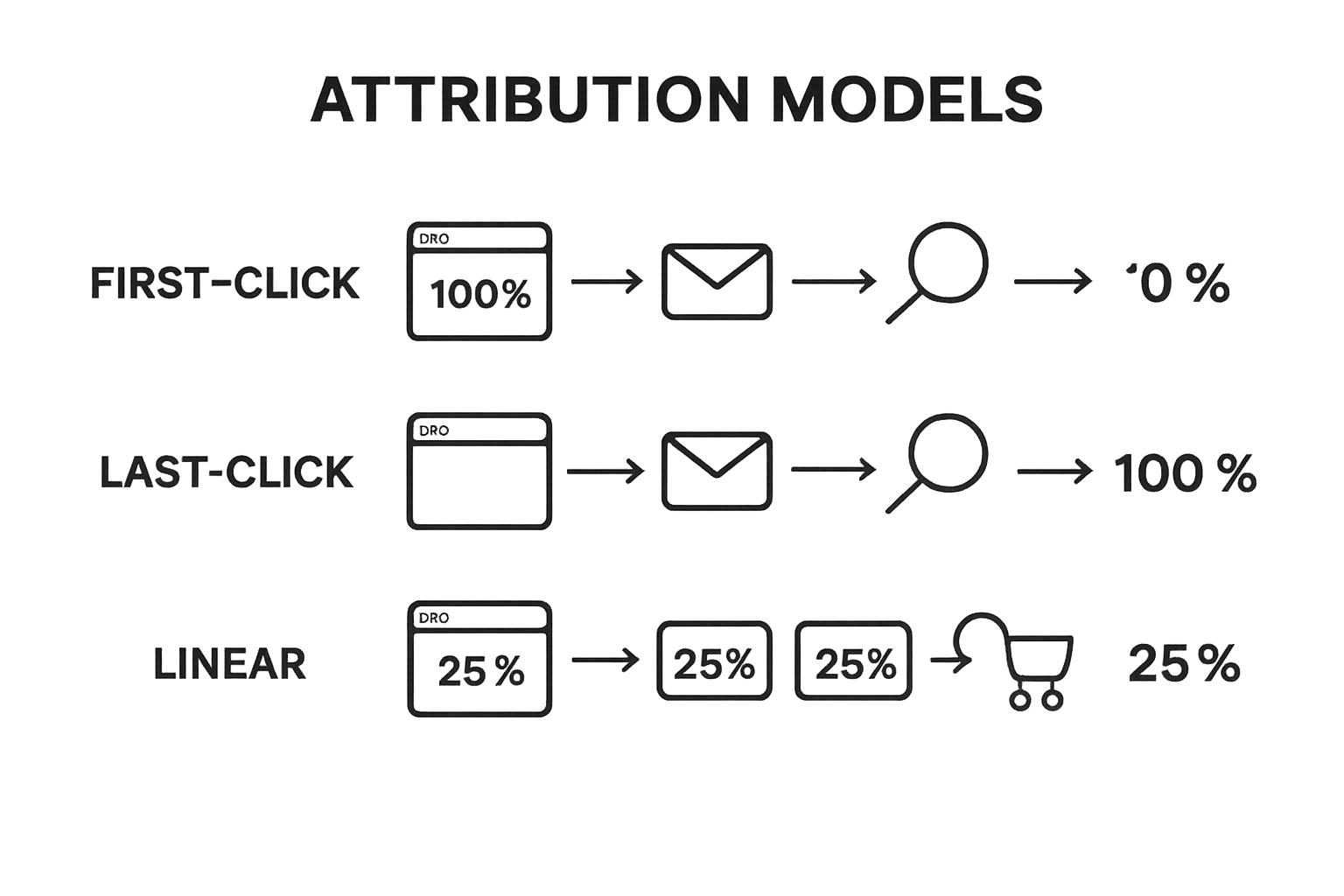Every business wants to know which marketing effort actually leads to a sale or sign-up. The surprising part is how tangled this process has become as customers now jump between countless channels and devices. Yet, brands that unlock the secrets of data attribution can see up to 30 percent higher return on their marketing investment compared to those still flying blind. That edge changes the rules entirely.
Table of Contents
- Defining Data Attribution And Its Importance
- The Challenges In Tracking Customer Journeys.
- Key Concepts In Data Attribution Models
- Impact Of Attribution Challenges On Marketing Strategies
- Emerging Solutions To Address Attribution Issues
Quick Summary
| Takeaway | Explanation |
|---|---|
| Data attribution identifies key marketing influences | This process helps businesses pinpoint which marketing interactions lead to conversions and drive results. |
| Effective attribution boosts marketing ROI by 30% | Successful data attribution management can significantly improve profitability by optimizing marketing spend across channels. |
| Complex customer journeys challenge tracking efforts | Modern customers engage through various devices and platforms, complicating the consistent capture of their interactions. |
| Advanced tracking technologies enhance data collection | Innovations like server-side tracking and machine learning improve how organizations gather and analyze customer data. |
| Privacy compliance is crucial for attribution models | Businesses must balance insightful attribution with user data protection strategies to maintain trust and transparency. |
Defining Data Attribution and Its Importance
Data attribution represents a critical analytical process that tracks and assigns credit to specific marketing touchpoints responsible for driving customer conversions and business outcomes. At its core, data attribution helps organizations understand which marketing channels, campaigns, and interactions contribute most significantly to achieving desired results.
Understanding the Core Concept
Marketing data attribution functions like a comprehensive detective work for digital interactions. When a customer completes a purchase or takes a desired action, data attribution identifies the precise marketing interactions that influenced their decision. These interactions might include website visits, social media engagement, email marketing, paid advertisements, or organic search results.
The fundamental goal of data attribution is transforming raw data into meaningful insights. By mapping the customer journey, businesses can:
- Understand which marketing channels generate the most valuable interactions
- Allocate marketing budgets more strategically
- Optimize campaign performance across different platforms
Why Data Attribution Matters for Modern Businesses
In an increasingly complex digital ecosystem, businesses cannot afford to operate with incomplete or misunderstood data. According to Google Analytics, companies that effectively implement data attribution can improve their marketing return on investment by up to 30%.
The importance of data attribution extends beyond simple performance tracking. It provides a nuanced understanding of customer behavior, revealing intricate patterns of interaction that traditional measurement techniques might overlook. Read more about advanced marketing attribution strategies to gain deeper insights into this powerful analytical approach.
By precisely tracking how different marketing touchpoints contribute to conversions, businesses can make data-driven decisions that enhance overall marketing effectiveness and efficiently allocate resources toward the most impactful strategies.
The Challenges in Tracking Customer Journeys.
Tracking customer journeys has become increasingly complex in the digital landscape, presenting significant obstacles for marketers seeking to understand and optimize user interactions. The proliferation of digital platforms, devices, and communication channels has transformed how customers engage with brands, making comprehensive tracking more challenging than ever before.
Multi-Device Complexity
Customers no longer follow linear paths when interacting with businesses. A typical journey might involve multiple devices and platforms: starting a product search on a smartphone, continuing research on a laptop, and ultimately completing a purchase on a tablet. This fragmented interaction makes consistent tracking extraordinarily difficult.
The primary challenges in multi-device tracking include:
- Identifying unique users across different platforms
- Maintaining consistent user profiles
- Accurately attributing conversion sources
- Preventing data fragmentation
Privacy and Tracking Limitations.
Strict privacy regulations and increasing user awareness have dramatically transformed data collection practices. According to research from the National Institutes of Health, organizations now face significant challenges in collecting comprehensive user data while maintaining compliance and user trust.
Modern tracking strategies must navigate complex constraints such as:
- Browser cookie restrictions
- User consent requirements.
- Cross-platform tracking limitations
- Advanced privacy protection technologies
Discover strategies for implementing effective tracking systems that respect user privacy while gathering meaningful insights.
These challenges underscore the need for sophisticated, privacy-conscious tracking methodologies that can adapt to an increasingly fragmented digital ecosystem. Successful organizations will develop flexible, user-respectful approaches that balance detailed insights with robust data protection principles.
This table outlines the primary challenges associated with tracking customer journeys, highlighting both technological and regulatory obstacles that affect data attribution accuracy.
| Challenge | Description |
|---|---|
| Multi-device complexity | Customers interact on various devices, fragmenting their journey |
| User identification difficulties | Matching unique users across platforms is challenging |
| Data fragmentation | Interactions are siloed across multiple channels |
| Cookie restrictions | Browser updates limit data tracking via cookies |
| User consent requirements. | Legal and ethical obligations require explicit user consent |
| Cross-platform tracking limitations | Barriers to following users across apps and websites |
| Advanced privacy technologies | New tools hamper traditional data collection methodologies |
Key Concepts in Data Attribution Models
Data attribution models represent sophisticated analytical frameworks designed to understand and quantify the impact of various marketing touchpoints on customer conversions. These models help businesses unravel the complex web of interactions that ultimately lead to desired outcomes.
Types of Attribution Models
Attribution models differ in their approach to assigning credit across multiple marketing interactions. Each model provides a unique perspective on how marketing efforts contribute to conversions.
 The most common attribution models include:
The most common attribution models include:
- First-Click Model: Credits the initial touchpoint that introduced the customer to the brand
- Last-Click Model: Gives full credit to the final interaction before conversion
- Linear Model: Distributes credit equally across all touchpoints
- Time Decay Model: Assigns more credit to interactions closer to the conversion point
- Position-Based Model: Allocates higher credit to specific touchpoints in the customer journey
Computational Complexity and Challenges
Modern data attribution goes beyond simple tracking. According to research from MIT, data attribution involves intricate processes of tracing model outputs back to specific data points, quantifying each interaction's influence on final outcomes.
The computational challenges in data attribution are significant. Businesses must navigate complex considerations such as:
- Handling multiple data sources
- Managing cross-platform interactions
- Accounting for varying customer journey lengths
- Maintaining accuracy across different marketing channels
Explore advanced marketing attribution strategies to understand how sophisticated models can transform your marketing insights.
Successful data attribution requires a nuanced approach that balances technical complexity with practical business insights. By selecting the right attribution model and understanding its limitations, organizations can develop more sophisticated marketing strategies that truly reflect the intricate nature of customer interactions.
The table below compares the main types of data attribution models, summarizing how each model assigns credit for conversions across the customer journey.
| Attribution Model | Credit Allocation Approach | Key Strength | Main Limitation |
|---|---|---|---|
| First-Click | 100% credit to the first interaction | Identifies initial customer engagement | Overlooks subsequent touchpoints |
| Last-Click | 100% credit to the final interaction before conversion | Highlights closing actions | Ignores earlier influences |
| Linear | Credit evenly distributed across all touchpoints | Treats all interactions equally | Lacks nuance for touchpoint value |
| Time Decay | More credit given to interactions closer to conversion | Emphasizes recent engagements | Can undervalue early interactions |
| Position-Based | Higher credit to first and last touchpoints, less to those in-between | Balances introduction and closing roles | May simplify diverse journey patterns |
Impact of Attribution Challenges on Marketing Strategies
Data attribution challenges fundamentally transform how businesses design, execute, and evaluate their marketing strategies. The increasing complexity of digital interactions forces marketers to rethink traditional approaches to understanding customer journeys and measuring campaign effectiveness.
Resource Allocation and Budget Optimization
Marketing teams face significant challenges in accurately distributing budgets across various channels. Without precise attribution, organizations risk:

- Overspending on underperforming marketing channels
- Underestimating the impact of subtle marketing touchpoints
- Misinterpreting conversion pathways
- Creating inefficient marketing investment strategies
Traditional measurement techniques no longer capture the nuanced interactions that drive modern customer decisions. This means marketing leaders must develop more sophisticated approaches to understanding campaign performance.
Strategic Decision Making
According to research from the University of Southampton, digital advertising campaigns increasingly span multiple platforms, making accurate performance measurement critically complex. Inaccurate attribution directly impacts strategic decision-making processes, potentially leading to misguided marketing interventions.
Key strategic implications include:
- Reduced confidence in marketing investment decisions
- Difficulty identifying high-performing marketing channels
- Challenges in creating personalized customer experiences
- Limited understanding of true customer conversion pathways
Discover advanced marketing tracking techniques to navigate these complex attribution landscapes.
Successful modern marketing strategies require a holistic, adaptable approach that acknowledges the intricate nature of digital customer interactions. By recognizing the limitations of traditional attribution models, organizations can develop more nuanced, data-driven marketing approaches that genuinely reflect the complexity of contemporary consumer behavior.
Emerging Solutions to Address Attribution Issues.
Modern data attribution challenges demand innovative technological and strategic approaches that go beyond traditional tracking mechanisms. Businesses are increasingly developing sophisticated solutions to capture and analyze complex customer interactions across multiple digital platforms.
Advanced Tracking Technologies
Next-generation tracking technologies are revolutionizing how organizations capture and interpret customer journey data. These emerging solutions focus on overcoming previous limitations by implementing more comprehensive and privacy-conscious tracking methodologies.
Key technological innovations include:
- Server-side tracking systems
- Machine learning predictive attribution models
- Cross-device identity resolution techniques
- Consent-based tracking frameworks
- Advanced privacy-preserving data collection methods
Privacy-Compliant Attribution Strategies
According to research published in the journal Patterns, organizations are developing innovative approaches to maintain data transparency while respecting user privacy. The goal is creating attribution models that provide meaningful insights without compromising individual user data protection.
Privacy-compliant strategies andcompass:
- Implementing strict data minimization principles
- Developing anonymized tracking mechanisms
- Creating granular user consent management systems
- Utilizing aggregated and statistical data analysis techniques
Explore comprehensive marketing tracking solutions designed to navigate these complex attribution landscapes.
The future of data attribution lies in developing flexible, ethical, and technologically advanced tracking methodologies. By combining cutting-edge technologies with robust privacy frameworks, organizations can create more accurate, transparent, and user-respecting approaches to understanding customer interactions.
Take Control of Your Data Attribution and Overcome Tracking Challenges
Struggling with data fragmentation and unreliable conversion tracking as explained in the article? When modern analytics no longer capture every valuable interaction and privacy barriers interrupt your insights, it is easy to feel left behind. The complexities around customer journeys, cross-device tracking and compliance with GDPR regulations can seriously harm your marketing performance and budget allocation. With rising concerns about data loss and inaccurate reporting, your business cannot afford to operate on guesswork.

Now is the moment to put every conversion in the spotlight. AdPage delivers robust server-side tagging solutions and advanced consent management tools, guaranteeing accurate tracking and analysis on all e-commerce platforms. You gain peace of mind knowing you are measuring 100% of conversions with GDPR-compliant technologies designed for Shopify, WooCommerce and Magento users. Start your journey to reliable data attribution and turn complex challenges into growth opportunities. Visit AdPage to transform your marketing strategy today.
Frequently Asked Questions
What is data attribution?
Data attribution is the analytical process that tracks and assigns credit to specific marketing touchpoints that lead to customer conversions and business outcomes.
Why is data attribution important for businesses?
Data attribution helps businesses understand which marketing channels and campaigns contribute to their success. It allows for better budget allocation and optimized marketing strategies based on customer interaction insights.
What are the challenges in tracking customer journeys?
The main challenges include multi-device complexity, where customers interact across various devices, and privacy regulations which impact data collection and tracking practices.
What types of data attribution models exist?
Common data attribution models include First-Click, Last-Click, Linear, Time Decay, and Position-Based models, each providing a different perspective on how marketing efforts contribute to conversions.



.png)
